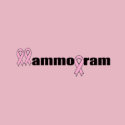 T-Shirt - Think Pink Breast Cancer
T-Shirt - Think Pink Breast Cancer by
breastcancertshirts This past month I had a bit of a scare. My annual mammogram came back showing something the doctor thought needed a second look. I was sent for a diagnostic mammogram which happily determined that all was well, no breast cancer for this gal right now. The radiologist showed me the area of concern, a place that looked like a mass on the underside of my breast on the first mammo. It was such a relief to know it was a false alarm.

Still, I sat in a waiting room full of women, many of whom had already been diagnosed with breast cancer and were back for screening follow-ups. I felt so bad hearing their stories of having lost a mother or sister to breast cancer and how breast cancer runs in their families. There but for the grace of God...
So please, have your annual screenings! Do breast self-exams regularly. I know I will be from now on.
To raise awareness about this important issue in women's health, here are some great breast cancer t-shirts from
SagArt Gallery.
 T-Shirt - Breast Cancer Walk
T-Shirt - Breast Cancer Walk by
breastcancertshirts

T-Shirt - Breast Cancer Fight by
breastcancertshirts
According to the American Cancer Society, all women over the age of 40 should have yearly mammograms.
4 Important Things to Know About Mammograms
1. They can save your life. Finding breast cancer early reduces your risk of dying from the disease by 25 - 30% or more. Women should begin having mammograms yearly at age 40, or earlier if they're at high risk.
2. Don't be afraid. It's a fast procedure (about 5 - 10 minutes), and discomfort is minimal. The procedure is safe: there's only a very tiny amount of radiation exposure from a mammogram. To relieve the anxiety of waiting for results, go to a center that will give you results before you leave.
3. Get the best quality you can. If you have dense breasts or are under age 50, try to get a digital mammogram.
* Bring your old mammogram films with you for comparison.
* Have more than one radiologist read your study.
* Ask if your center has CAD—computer aided detection—which calls the radiologist's attention to any possible areas of concern.
* Make sure the doctor who referred you for the mammogram includes an explicit note when ordering the study (providing clinical correlations—e.g. "palpable mass in the upper outer quadrant, rule out abnormality").
* Correlate your results with other tests you've had done, like ultrasound or MRI.
* Discuss your family history of breast and other cancers—from both your mother's AND father's side—with your doctor.
4. It is our most powerful breast cancer detection tool. However, mammograms can still miss 15—20% of breast cancers that are simply not visible using this technique. Other important tools—such as breast self-exam, clinical breast examination, ultrasound, and MRI—can and should be used as complementary tools, but there are no substitutes or replacements for a mammogram.
- From
Breast Cancer.org - please visit their site for more excellent information on mammograms.













